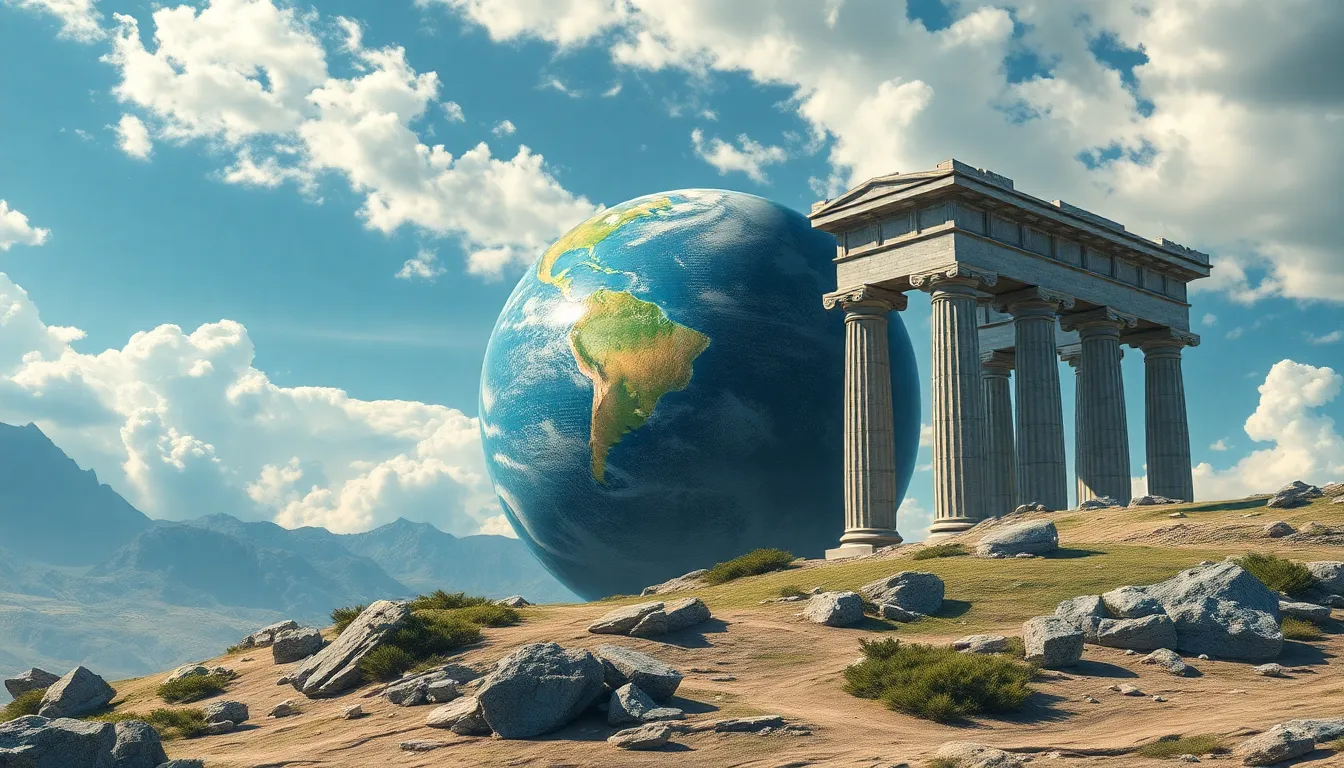Atlas and the Earth: How Mythology Influences Our Understanding of Nature
I. Introduction
In Greek mythology, Atlas is often depicted as a powerful Titan condemned to hold up the heavens for eternity. This image has transcended myth, influencing various aspects of culture and art throughout history. The significance of the Earth, both as a physical entity and a symbol in mythology, plays a crucial role in how humans perceive their place within nature. By exploring the relationship between mythology and our understanding of the natural world, we can gain deeper insights into the cultural frameworks that shape our environmental consciousness.
II. The Myth of Atlas: Background and Significance
The origins of the Atlas myth can be traced back to ancient Greek literature, where he is often mentioned in the works of Hesiod and Homer. According to myth, Atlas was a Titan who fought against the Olympian gods during the Titanomachy. As a punishment for his rebellion, he was condemned to hold up the sky, a task that has often been misinterpreted as him holding up the Earth.
Atlas serves as a symbol of endurance and strength, representing the burden of responsibility that comes with power. The imagery of Atlas holding up the heavens emphasizes his role in the cosmos, where he is both a guardian and a prisoner of fate. The duality of his burden—holding up the sky versus the Earth—speaks to the complexity of existence itself.
III. Mythology as a Framework for Understanding Nature
Myths serve as cultural narratives that shape how societies understand natural phenomena. They offer explanations for the mysteries of the world and provide a framework for interpreting the environment. For instance, the story of Gaia, the Earth goddess, illustrates the nurturing aspect of nature, while Poseidon, the god of the sea, symbolizes the unpredictable power of water.
- Gaia: Represents fertility, growth, and the nurturing qualities of the Earth.
- Poseidon: Embodies the tumultuous and often chaotic nature of the sea.
- Demeter: The goddess of agriculture, highlighting the importance of the Earth’s produce.
Through storytelling, ancient cultures sought to make sense of their surroundings, connecting human experiences to the natural world. These narratives have paved the way for scientific comprehension, providing a basis upon which modern environmental science can build.
IV. The Earth in Mythology: A Symbol of Stability and Change
The Earth is often depicted as a nurturing force across various cultures. Many myths portray the Earth as a mother figure, providing sustenance and stability. However, these same myths also depict the Earth as a source of chaos and destruction, reflecting the duality of nature.
For example, in Greek mythology, the tale of Demeter and Persephone illustrates the cyclical nature of life and death, as well as the changes of the seasons. This myth emphasizes how the Earth provides life while also undergoing transformations that can lead to hardship.
- Stability: The Earth as a provider of life, food, and shelter.
- Change: The Earth’s ability to transform, often resulting in natural disasters or climatic shifts.
This duality serves as a reminder of the complexities inherent in our relationship with nature, highlighting the need for respect and understanding.
V. Atlas in Modern Culture: Legacy and Interpretations
Atlas has been depicted in various forms of art and literature throughout history. From Renaissance paintings to contemporary sculptures, his image evokes themes of strength, burden, and perseverance. Modern interpretations of Atlas often focus on the weight of responsibility, highlighting the challenges we face in the modern world.
In contemporary environmental discussions, the figure of Atlas serves as a metaphor for humanity’s role in bearing the weight of ecological responsibility. As climate change and environmental degradation pose significant challenges, the legacy of Atlas encourages a reflection on our duties toward the planet.
VI. The Intersection of Mythology and Environmental Science
Ancient myths provide valuable insights that can inform current ecological understanding. For instance, many indigenous cultures have narratives that emphasize the sacredness of nature, promoting a sense of stewardship. These stories often encourage practices that align with sustainable living and respect for the Earth.
Mythology can play a crucial role in promoting environmental stewardship by:
- Encouraging respect for natural resources through traditional narratives.
- Highlighting the interconnectedness of all living beings.
- Inspiring communities to engage in conservation efforts based on cultural beliefs.
Case studies of mythological narratives influencing conservation efforts can be seen around the world, where local legends guide sustainable practices and protect sacred lands.
VII. Lessons from Atlas: Bridging Myth and Reality
The Atlas myth offers profound insights into human responsibility. It serves as a reminder that with great power comes great responsibility, urging us to reflect on our impact on the environment. Myths foster a connection to nature, encouraging individuals to recognize their role in the ecosystem.
Furthermore, these narratives can inspire action in the face of environmental challenges, illustrating how cultural stories can motivate communities to work towards sustainability and conservation.
VIII. Conclusion
In conclusion, the influence of mythological figures like Atlas on our understanding of nature is profound and enduring. Myths provide frameworks for interpreting the world around us, offering insights into the complexities of human existence and our relationship with the Earth. As we navigate contemporary environmental challenges, the relevance of Atlas and other mythological narratives remains significant. They invite us to integrate mythology into environmental education and awareness, fostering a deeper connection to the natural world and inspiring action for its preservation.




